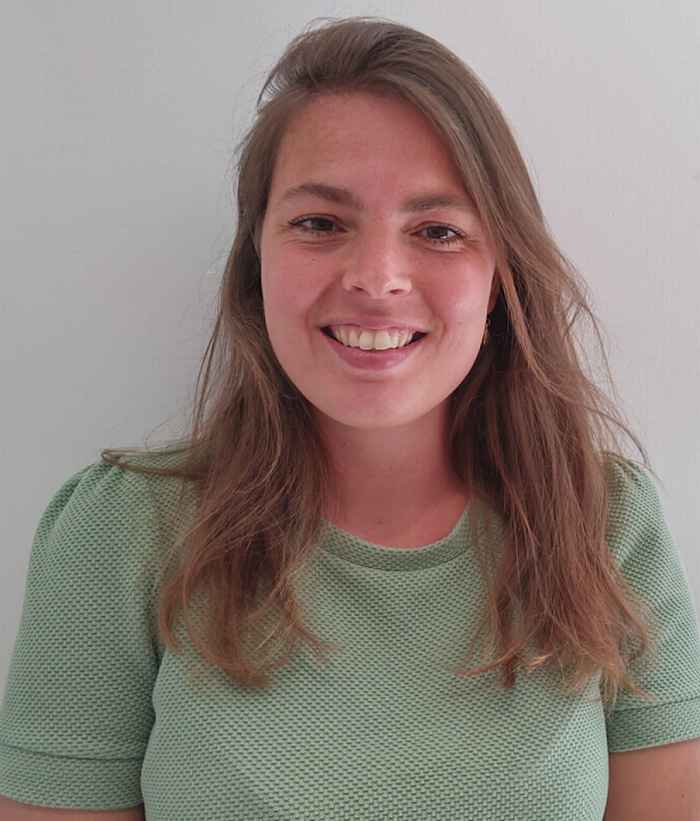‘In the energy and climate transition, a lot is going to happen’
Interview with law alumna Charlie van der Star
4 September 2023

'Peculiar.' That is how law alumna Charlie van der Star calls the combination of the Master's tracks in private law (2014) and constitutional and administrative law (2015). 'Many colleagues who practise private law do not like public law very much and vice versa.' Van der Star finds both fields interesting and is glad she was possible to combine these Master's at the UvA. 'To this day, the fact that I did both disciplines proves very relevant in my work.'
Real estate projects and sustainable energy projects
As Senior Associate at the international firm Osborne Clarke, Van der Star works mainly on real estate projects and renewable energy projects. 'The interface between private and public law and my interests come together very nicely in this. I can look at a project with both hats on.' She illustrates how both aspects play a role with an example. 'A client wants to purchase land, for example to realise a solar park. Besides buying the plot, building rights or easements may have to be established for certain adjacent plots. In addition, an anterior agreement may have to be concluded with the municipality. At the same time, a zoning plan amendment and permits may also have to be obtained and a subsidy for the project.'
It is very important to me that my work adds to society.
During her studies, Van der Star still thinks she does not want a toga profession. She has a certain perception of that world and believes it does not suit her. Nevertheless, she decides to gain experience through internships. 'I did work internships at a number of law firms, but also at the court to experience the other side. I turned out to like the law practice. Every client is different, with a different firm and different strategies. That makes it very varied. The work is never boring.' For her, law is most alive when she can also see what is achieved with it. 'I like it when something is realised that you can actually see, based on agreements that all parties have made with each other. For example, larger infrastructure or energy projects. It is very important to me that my work adds to society.'
‘Everyone knows each other by first name’
Osborne Clarke is geographically on the edge of the Zuidas in Amsterdam, but Van der Star does not think it is an average Zuidas office. 'We are an international medium-sized office. Everyone knows each other by first name.' She praises the friendly character that prevails there. 'It is a flat organisation with little hierarchy. I don't know how it is at all the other firms, but I suspect Osborne Clarke is unique in that.' The lawyer explains how the firm handles trainee lawyers, for example. 'There are firms that hire more students than they end up keeping. With us, a position is created in a team because we are keen to train someone. This is with a long-term view: someone learns and stays.'
According to Van der Star, her employer ensures a constant level of quality. 'Before you become a senior, you take a more in-depth course from the Grotius Academy, for example. You can do that if you have at least 5 years of work experience. I recently took the Grotius specialisation course in real estate. It is an active course that you have to invest time in, but it provides a lot of new knowledge.' The firm encourages its legal staff to keep developing to maintain the quality of the office.
Heating from deep earth layers
In the future, Van der Star hopes to specialise even further in sustainability projects. She is already working on renewable energy projects in the context of climate change. 'This is getting higher and higher on the political agenda,' she says. 'In the energy and climate transition, there is obviously going to happen a lot. Solar farms and wind farms appeal to the imagination, but there are more and more innovations coming. For example, innovations with CO2, hydrogen, et cetera. I want to contribute to this in a legal context.'
She tells about a client who is getting started with geothermal energy: heating from the deep earth layers. The heat can be used for district heating, for example, but also for the horticultural sector. 'There are more and more alternative energy sources. These projects need to be set up; they need to be built. Advice has to be given on how to structure the project, how to cooperate with competent authority, municipalities, province. There's a lot involved in that.' Also because she finds it personally important that more is done in the field of sustainability, it is an angle in which she wants to continue. But real estate also remains important, she points out. 'Because how do you acquire land or how do you make agreements? That remains relevant, but under the "energy project" pillar.'